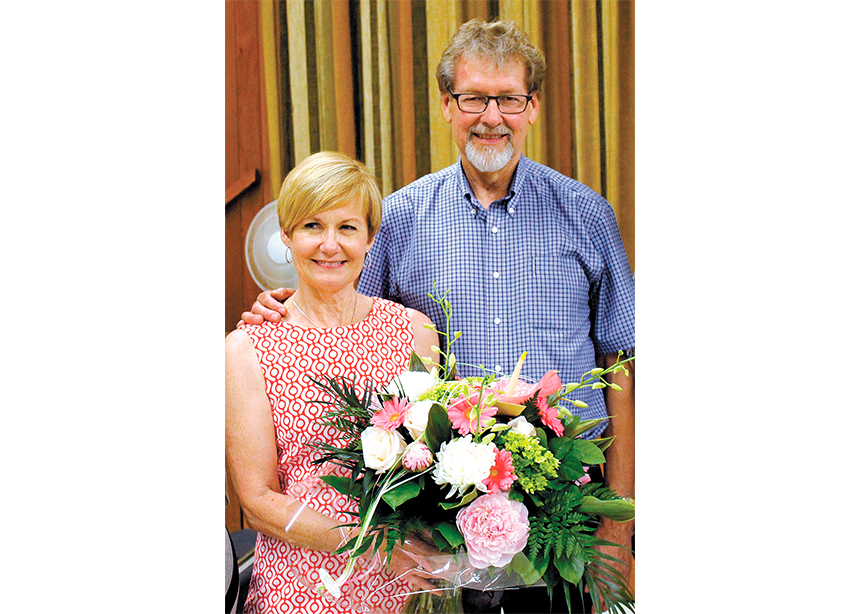“You don’t go quickly from Egypt to the Promised Land,” quips Harold Schlegel. “The wilderness is where God forms us.”
The wilderness Schlegel speaks of is the transition in a congregation’s life between one pastor and another. Church leaders suggest it’s a time that’s ripe for interim or transitional ministry.
An interim pastor, hired for one or two years, may be a supply pastor who preaches and provides pastoral care, or an intentional interim pastor who helps a congregation work through difficult issues. In Mennonite Church Eastern Canada, some pastors are hired as transformational ministers for three to five years, with the intention of changing the congregation’s culture.
Some congregations are uncomfortable spending any time in the wilderness and prefer to hire a new pastor as soon as the previous one leaves. But, according to Schlegel, who has served in five interim roles in both Ontario and Manitoba, “if congregations don’t take time to do transition well, the next pastor is very short-term.” Ken Bechtel, whose experience in transitional ministry spans more than two decades, says this person can become an “unintentional interim pastor.”
Rick Neufeld, director of Leadership Ministries for MC Manitoba, says, “Some congregations hesitate because they see [interim ministry] as stalling. In fact, the opposite is true.” He says interim ministry can give congregations “opportunity to revisit their goals and vision,” and can “assist in the health of the congregation.” Bechtel says, “The time between pastors can be really fruitful.”
In MC Eastern Canada transitional ministry is strongly supported. “We try to advocate and encourage interim ministry in most of our congregations when they are in transition,” says Henry Paetkau, regional church minister for MC Eastern Canada. At any given time, says Paetkau, the regional church may have eight to 10 interim ministers in place.
Neufeld also encourages MC Manitoba congregations to consider interim pastors. “I think there would be good reason for every congregation to have an interim minister,” he says, “but not every congregation chooses to do so.” In the past year five MC Manitoba congregations had transitional pastors.
Further west, engagement of an interim minister depends on availability. “If we had more available interim pastors we might use them more frequently,” says Tim Wiebe-Neufeld, MC Alberta’s executive minister. Alberta congregations have sometimes looked beyond their borders as well as beyond their denomination for interim ministers. Edmonton First Mennonite Church, for instance, currently has an interim pastor from the United Church of Canada.
While any congregation can benefit from the care of an interim pastor, there are certain circumstances in which transitional ministry is especially helpful:
- Following the departure of a long-serving pastor. In such cases, congregations may hope their new pastor will either be just like a previous, much-loved pastor, or the exact opposite of a pastor congregants have grown tired of. In this case, an interim pastor can provide space to reflect on and celebrate what was, and prepare for what is to come.
- Following congregational conflict. This can include trauma or clergy misconduct. It can also include repetitive negative behaviour patterns and what Bechtel calls “stuckness.” Schlegel, who currently works as director of donor development at Mennonite Collegiate Institute in Gretna, Man., says a transitional pastor can hold a mirror up to the congregation, “not to bring shame, but to help them see themselves as wonderfully made, loved and lovely, without needing to be perfect.”
- When a congregation considers closing its doors. If an aging or dwindling congregation feels it can no longer continue, an interim pastor may be called upon to guide it toward closure. On the other hand, an interim pastor may breathe new life into such situations, helping congregations re-invent themselves.
Grace Mennonite Church, in St. Catharines, Ont., hired Waldo Pauls as an intentional interim pastor. Congregational chair Ted Kopp says the church thought Pauls would “assist them toward a peaceful termination.” Instead, his presence rejuvenated the church. “He made us feel like we could still accomplish things,” Kopp says. Today the congregation employs David Brubacher as lead minister and Doug Schultz as outreach pastor.
There are likely as many reasons for being an interim pastor as there are interim pastors. For some, the short-term nature of the commitment is attractive. After eight years as executive director for Mennonite Central Committee (MCC) Saskatchewan, Claire Ewert Fisher longed to return to pastoral work. But, she says, “I didn’t know if I had the energy to get into full-time, long-term ministry.” A one-year, half-time position with Grace Mennonite in Prince Albert, Sask., was just right for her. Similarly, Wanda Roth Amstutz found the short-term nature of interim ministry appealing as a way to re-test her calling after a stint with MCC in Ethiopia.
For other pastors, the nature of the work is attractive. “Interim ministry can be very change-focussed,” says Melissa Miller. Currently serving at Home Street Mennonite in Winnipeg, Miller admits, “I’m drawn to change, to where the Spirit is leading.”
Bechtel echoes Miller’s viewpoint. “In interim ministry the attraction is that you get to see some things happen in a congregation. There’s excitement around that,” he says.
Inherent in transitional ministry is the assumption that difficult issues are on the table, which can also be attractive. As Bechtel points out, in long-term ministry a pastor can spend many hours just getting permission to tackle those difficult issues. In transitional ministry, tackling difficult issues is one of the things the pastor was hired to do.
It follows, then, that an interim pastor may not always be popular with a congregation. Ryan Siemens, MC Saskatchewan’s executive minister, says, “They’re there to stir the pot, and, in some cases, be disliked.” Gerry Binnema, whose first pastorate was an interim position with Living Hope Christian Fellowship in Surrey, B. C., says, “Sometimes there are sacred cows that need to be taken down. You can be a bad guy in a way, and set the new person up.”
Brubacher, who has also been an interim pastor, doesn’t find the bad-guy model helpful. “People are more receptive to hard truths if spoken with love,” he says. “Once you’ve gained their trust, it is easier to speak, and for them to hear. People will embrace change if they can be convinced change will be a blessing.”
But when the timeline is short—typical terms last one or two years—how does a pastor gain the congregation’s trust? Ewert Fisher says, “It’s like speed dating. You’ve got to know people really quickly.” And that’s not always easy. “I was not familiar with the church’s history, so I had to rely on the memory of members,” she says. “You just have to know how to ask questions.”
Neufeld says that interim ministry may not be for every pastor. “You have to have the ability to work under stress and to manage conflict,” he says. “You have to have the skill to give a congregation the opportunity to really see itself and to move toward a healthy relationship with their next pastor.”
Brubacher, again, feels differently. “Interim ministry is not rocket science,” he says. “It involves pastoral care and making sure the congregation knows that you love them, building up trust as you care for them.”
Besides the dynamics of human relationships, there are other challenges that come with the territory. An interim pastorate may require either commuting or uprooting one’s family. For this reason alone, younger pastors may not be drawn to the work.
But if transitional ministry attracts more experienced pastors—pastors nearing or already enjoying retirement—this may stand congregations in good stead. Brubacher points out that depth of experience is essential in dealing with critical issues, especially when congregations have experienced conflict.
While experience is helpful, transitional pastors also value the training they have had. Many have availed themselves of courses offered through the Interim Ministry Network based in Baltimore, Md. In B. C., both Janzen and Binnema participated in a course offered by Delta-based Outreach Canada. Brubacher trained as a clergy coach with Rob Boyle of the Clergy Leadership Institute.
These courses are all ecumenical in nature, but Brubacher doesn’t see a problem with that. “We’re a small denomination,” he says. “If there are resources offered outside [the Mennonite church], how much do we need to do?” He adds, “There are benefits to being trained alongside others of other denominational backgrounds.”
Within the Mennonite church, MC Canada and MC U.S.A. have collaborated since the mid-1990s to offer short courses in transitional ministry. Bechtel has led six of these courses. “It’s fun doing trainings,” he says. “Pastors bring their own observations.” As part of the course, Bechtel gives them incomplete case studies to respond to. “It’s great to see the different approaches they come up with.”
Regardless of whether they have had training specific to transitional ministry, most pastors acknowledge they have learned many lessons along the way. Bechtel notes that each congregation has its own unique personality. “What works in one congregation won’t work in another,” he says. Miller agrees. “Adaptive leadership is critical in interim ministry,” she says. “There will be surprises along the way.”
Brubacher stresses the importance of listening. “You can’t be a leader without listening,” he says. “You listen so that you know what language they speak.”
Roth Amstutz says transitional ministry is “really about facilitating room for the Holy Spirit to be at work.” Miller also speaks of the awareness she has gained of “the many ways God’s Spirit is at work in congregations, in both celebration and fracture.” Likewise, Schlegel sees transitional ministry as God’s work. “I’m not responsible for what comes out,” he says, although, “I can help congregation members listen to each other and for what the Holy Spirit is saying to them.”
Whether interim ministry is necessary each time a congregation is in transition is debatable. But when a church finds itself at a crossroads, it may be worthwhile to spend some time in the wilderness. “One of our biggest challenges is the impatience that is prolific in our culture,” says Schlegel. “Sometimes we need to take time and let the Spirit work.”
For discussion
1. Have you ever felt that you were “in the wilderness” when your congregation was between pastors? Why do some congregations keep their pastors for a long time and others are always changing? Does your congregation look for a transitional pastor between long-term pastors? How can an interim pastor play a beneficial role?
2. Donna Schulz quotes Harold Schlegel as saying, “If congregations don’t take time to do transition well, the next pastor is very short-term.” Does this match your experience? Why might a lack of transition time shorten the next pastor’s tenure?
3. Do you know congregations that have experienced significant conflict during the time of a pastoral change? How could an intentional interim pastor have helped deal with the situation? What skills are important for intentional interim pastors?
4. In previous centuries Mennonite ministers were chosen from within the congregation (by lot in some traditions) and were generally not supported financially. How does your congregation choose a pastor? How does the way a church leader is chosen change the expectations of the role? What are the advantages and disadvantages of having the congregation employ the pastor?
—By Barb Draper









Leave a Reply
You must be logged in to post a comment.